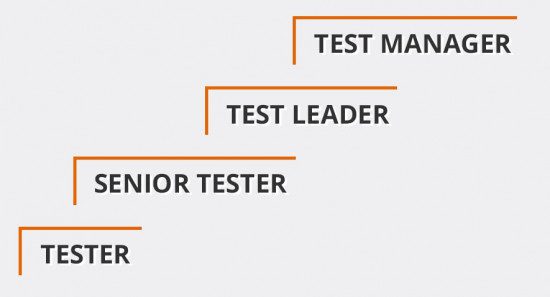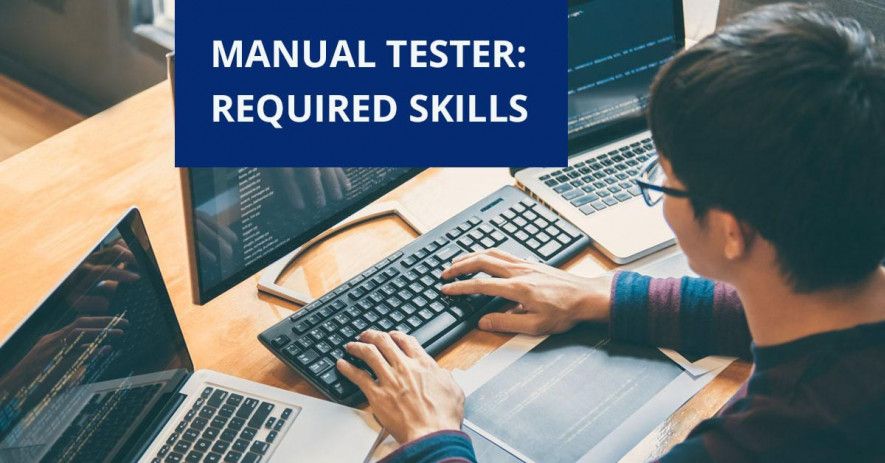- QATestLab Blog >
- QA Management >
- Team Management >
- Required Manual Testing Skills
Why the profession of manual tester is still required in the era of automation? What are the must-have skills for this occupation? QATestLab, as an independent QA provider with more than 200 employees, has considerable expertise in the sphere of hiring QA specialists with the required skills. To get the first-hand information, read the blog article based on the interview of QATestLab HR specialists who definitely know how a pro in software testing should look like.
Manual Tester: team roles and responsibilities
Before analyzing the soft skills of a manual tester, let’s find out the positions he can occupy and responsibilities connected with them. Depending on the company and the sphere it works in, the project on quality assurance may offer such roles for manual testers: Tester, Senior Tester, Test Leader, Test Manager.

For each role and position, there are certain technical tasks and responsibilities. The Tester performs the following tasks at a project:
- Participates in the analysis of requirements and specifications for the software being developed.
- Analyzes the test plan and test design specification, and also participates in their creation.
- Creates tests and adds information to the appropriate testing tool.
- Performs tests at all levels of testing.
- Adds information about bugs in the defect management tool.
- Prepares a daily/weekly progress report for his manager.
The position of a Senior Tester presupposes some additional duties as compared with those of a tester:
- Is responsible for the creation of a test environment.
- Prepares the test data that is needed to perform the test.
- Creates test scenarios and checks those created by colleagues and makes the necessary additions.
- Measures the performance of a program component or the entire system.
- Automates tests using the necessary tools.
Test Leader accomplishes the following tasks:
- Creates and coordinates a Test Strategy and Test Plan with the Project Manager and other stakeholders.
- Writes a Test Plan and makes changes to it during the development of software.
- Forms the team of testers for project accomplishment.
- Analyzes open defects and adds the necessary information.
- Defines what tests can be automated, at what level, and how.
- Selects tools for automated testing.
As for Test Manager, he/she performs such tasks:
- In case of problems at the QA project, takes the necessary measures for their localization and elimination.
- Selects the proper methodology for project management after handling all the details with the client.
- Selects the metrics that will be used at the project to analyze the quality of testing and assess progress during the workflow.
- Identifies risks on the project and takes measures to reduce them.
- Actively participates in meetings with customers and offers his own methods for solving the possible issues.
- Helps the employees and colleagues to grow professionally.
For a tester, this list of duties is useful because he/she sees how much work managers have, and what is more important, what to strive for if he wants to grow in his professional development.
Expert opinion: skills required for manual tester
We have interviewed QATestLab specialists on human resources and found out what skills they look for when hiring a QA engineer. Have a look at the list with basic soft skills necessary for the position of a manual test engineer.
Curiosity is a driving force for the work of every tester. The testing process is based on the desire to find something new, understand the principles of how it works, and check its correspondence with the input information.
Details consideration. “Our QA engineers are very attentive to details, and they are firs who notices your new haircut or manicure.” – shares Marina, QATestLab HR specialist.
Clear language. If you regard QA as a sphere to work in, you should train the skill of clear explanation of the needed information so that people not engaged in this sphere could understand you. This is also relevant for bug reports which must be precise and informative.
Honesty. Testers should always provide all the information about the bugs in the app or risks they faced on the project. Sometimes managers cannot notice everything, but fair feedback of a tester can help make the right project estimations and meet the client’s needs.
Ability to work in a team. Both programmers and testers work together to create a high-quality product on the market, which will satisfy customers and users in the future. If a person is not ready to give himself up to work a hundred percent, share advice and ask for help if needed, QA isn’t for him.
What else to know about testing skills
The first iteration between an employer and employee happens through the resume, that’s why pay special attention while composing it. At first, analyze the skills required for this position with the ones you possess to include them to your CV. Be honest and do not exaggerate as it will be revealed during the personal interview. Do not forget to write about any experience you had that is connected with QA and may be interesting to stakeholders. Be critical to yourself, and if you see that you can improve your skills or get the missing experience – go for it! QA is a promising sphere, and there is definitely a place to grow professionally if you choose manual testing as a career path.
Learn more from QATestLab
Related Posts:
- What are Fears of Manual Test Engineers?
- Continuous Testing and Test Automation: What is the Difference?
- What is Teamwork for Senior Software QA Engineer?
About Article Author
view more articles
has 3-year experience in blogging, technical writing, and copywriting.
View More Articles







No Comments Yet!
You can be the one to start a conversation.